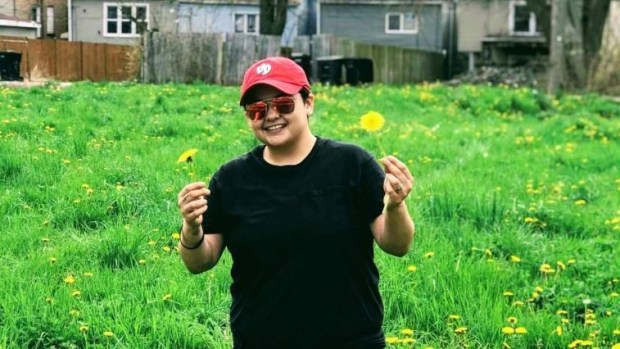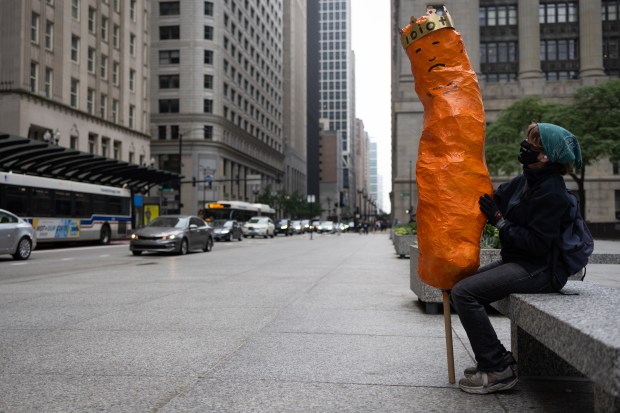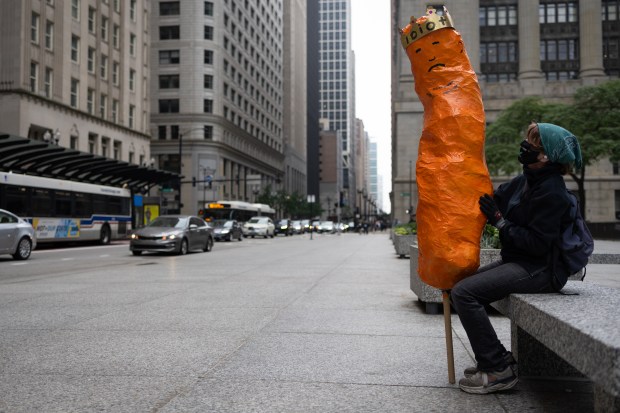Melony and Sarah Bustamante carefully placed colorful trinkets and flowers at their younger sister’s grave. Amy was an artist, they said, so she’d appreciate the effort.
The bright pink flamingos were one of Amy’s favorite animals. She might have found the rainbow flowers that blow in the breeze comforting because she was gay. Melony’s daughter painted the pink and yellow butterfly statue specifically for her tía, they said.
“Amy loved to draw and paint so much — she would do it everywhere,” Sarah, 34, recounted during a recent visit to St. Mary Cemetery in Evergreen Park while surrounded by a few other family and friends. “As long as she had the image in her head she was going to put it down. It was very therapeutic for her.”
Amy Brown, 22, was fatally stabbed during what police described as a domestic-related altercation in the Back of the Yards neighborhood on June 26, 2022. Two years after her death, Brown’s family still mourns, cycling between the mixed emotions of shock, depression and anger that experts say are common for families of homicide victims. They also are calling for a renewed investigation into her case where no one has been charged.
The night Brown died, officers responded to reports of a person stabbed in the 5200 block of South Carpenter Street around 10:25 p.m., according to a police report. Officers found Brown unresponsive outside on the grass with multiple stab wounds and two knives near her body, the report said. Brown’s family said she lived in the home where she was killed.
The alleged attacker’s hands and arm were covered in what officers believed to be blood, and he was placed in custody. He told officers at the scene that Brown had attacked him with knives after she came home screaming, according to the report. In self-defense, he then grabbed the knives away from her, and stabbed her, the report said.
Melony said the alleged attacker called her after the stabbing and told her what had happened, at which point she called 911. Sarah, who lived nearby, discovered Brown lying outside. Officers found her outside yelling for help when they arrived, the police report said.
“As soon as I get to the backyard, I see her laying on the side of the building. I automatically run to her, screaming to her, trying to wake her up, hold her,” Sarah said. “It feels like it was forever, but then it feels like it was very fast.”
“The paramedics came. They tried to resuscitate. They cut her shirt off to see where her wounds were at,” she continued. “The cops tried separating me from her. I didn’t want to leave her side because I wanted her to know that she was loved and that she was not alone.”
Paramedics took Brown to the University of Chicago Medical Center in critical condition, where she later died. The Cook County medical examiner’s office ruled Brown’s death a homicide caused by multiple sharp-force injuries. An autopsy showed she had more than 20 stab wounds.
A suspect was released without charges, police said at the time. A police spokesperson said Wednesday that the case is classified as “exceptionally cleared, closed” because of a bar to prosecute. This means that police think they correctly identified the suspect in an investigation, but prosecutors declined to bring charges after evaluating evidence presented by detectives.
But both sisters said they want further investigation from police into the case to lead to criminal charges. They don’t believe the attack was in self-defense.
“See Amy as if she was their family member. How would they treat the case? Just because we are a minority and we come from different neighborhoods and we went to different schools … doesn’t mean we’re not worth fighting for,” Sarah said. “Her life mattered, and that’s what hurts me the most.”
Grief for family members of homicide victims can be a lengthy process, said Dr. Traci Kurtzer, medical director of trauma-informed care and education at Northwestern Medicine’s Department of Obstetrics and Gynecology. There are often initial feelings of horror and anger, which can evolve into feelings of sadness and isolation, she said.
Special occasions such as birthdays or anniversaries can heighten these emotions, she said. She recommends that families or friends experiencing them seek peer support or guidance from mental health professionals.
“There’s just such sadness about what happened, and in some cases there may even be a little bit of feeling guilt that maybe they missed signs, or they didn’t protect their loved one enough,” she said. “As with anybody who loses somebody in a traumatic and violent way, it just never goes away. It’s always that sense that somebody who should be there is missing.”
When Melony, 36, thinks about Brown, she remembers her as a fun, dedicated aunt to her eight nieces and nephews. One year she dressed up as Santa Claus at Christmas for the kids, Melony said. Because she didn’t know how to properly talk like Santa, she reverted to a British accent, Melony laughed.
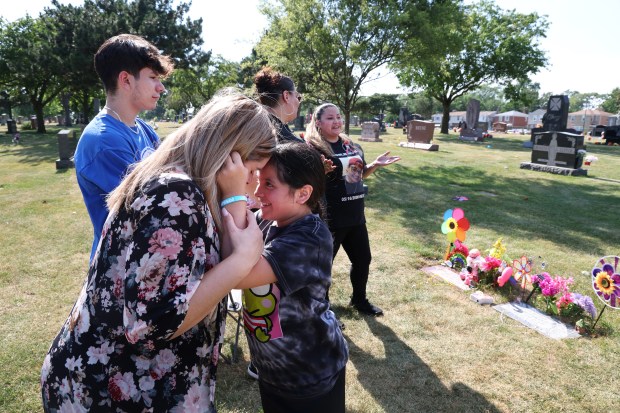
She also described Brown as brave, energetic and bubbly, saying she enjoyed skateboarding, cooking, going to the beach and hanging out with friends. Her favorite food was “anything to do with chicken” and she enjoyed listening to rock ‘n’ roll, specifically the Rolling Stones, Kiss and Nirvana. She was on staff at a hotel on the North Side, and hoped to move up to a cooking position one day, Melony said.
“She was a really good supporting, caring friend and sister,” she said. “She wasn’t afraid to try anything new.”
After Brown’s death, her family said the “nightmare” didn’t end, especially because their mother had died a year prior. Brown’s grave is beside her mother’s at the cemetery.
Melony, who worked in the mental health field, said she left work for about a year. She signed up for therapy and enrolled in a partial hospitalization program. She said she spent a lot of time healing, sleeping and walking in nature. But she still struggles with nightmares, saying it can be very painful to think about her sister’s death, but that on the anniversary, she doesn’t want to sit idle any longer.
“It felt like and still feels like an absolute nightmare,” she said. “It absolutely draws a thin line between reality and stability. Some days, I just feel like it can all come crumbling down.”
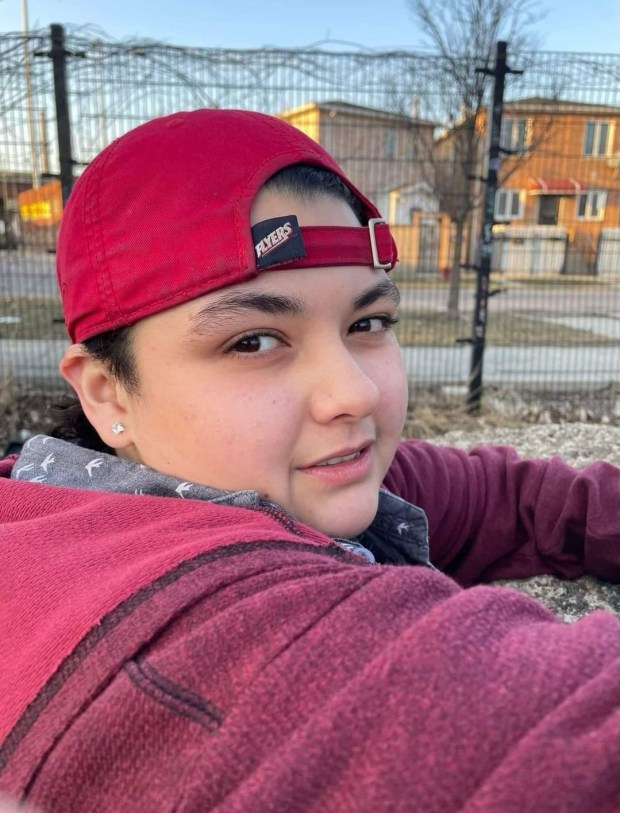
For Sarah, Brown was not just her little sister but her best friend — they just clicked, she said. Brown was caring, like their mom, and had a wild personality, she said. Brown also helped out with her kids after their father died, she said.
She doesn’t think she’ll ever get over her death. But every day is different, and some are filled with hope, particularly when she sees the sunrise on the way to work, she said. She keeps a lawn chair in the trunk of her car for her frequent visits to the cemetery to talk with Brown and listens to the last song Brown recommended before her death — “One More Light” by Linkin Park.
“We sing her favorite songs. We eat chicken sandwiches all the time because that was her favorite food,” she said. “And every time I see a skate park, I get very excited because I know that’s something she would have liked to see.”
“I forget that sometimes she’s not here,” she said.


